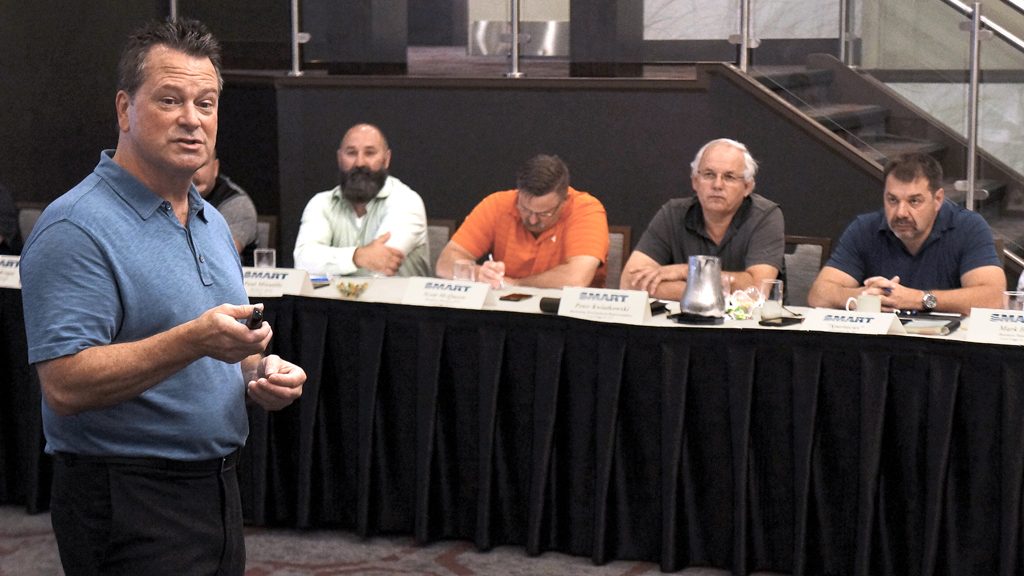Over the past four years Chris Carlough has helped train more than 400 sheet metal workers through numerous workshops in the U.S. on how to recognize and assist co-workers with escalating mental health problems.
Now Carlough, director of education with the International Association of Sheet Metal, Air, Rail and Transportation Workers (SMART), is planting the seed for this novel approach in the Canadian building industry.
Carlough recently ran the first comprehensive workshop for sheet metal union members across Canada at a Toronto hotel.
“The goal here is to do awareness training and to open the door for our local unions to reach out and develop some peer training,” he says.
He calls peer training “proactive intervention” that can help de-escalate mental health problems in construction.
He says peers are important in the mental health chain because “they can catch this (signs of escalating mental health problems) much earlier than their supervisors or mental health professionals.”
SMART will offer peer training assistance to any union local in Canada that wants to develop a corps of workers for peer support, he says.
“The brothers and sisters here representing local unions throughout Canada seem very anxious and eager to learn and put it into practice (a peer support network) to help members who are experiencing mental health issues,” he adds.
Stateside, Carlough’s goal is to have a least one person on every jobsite with peer support training completed through the SMART MAP — the union’s program that addresses mental health issues with a primary focus on substance use disorders and suicide prevention.
“I believe it is achievable.”
He says mental health problems often related to drug addiction can’t be swept under the rug anymore. Many workers have drug addictions — 91 Americans die every day from opioid overdoses.
The more we don’t talk about it and stuff it inside, that is when a lot of things come out sideways
— Chris Carlough
SMART
The cost to employers is about $276 billion annually, according to U.S. government sources. Half of those costs are for U.S. health care.
The workshop training includes how to recognize signs and symptoms of someone in distress and tactics of prevention, including compassion/support and how to link workers to mental health resources, he points out.
“It’s the next step in a long-range plan to sharpen training and provide resources nationwide for all of our locals,” says Carlough.
It is important to dismiss the tough guy image in the construction industry, he states.
“The more we don’t talk about it and stuff it inside, that is when a lot of things come out sideways such as substance abuse or dangerous behaviours,” he says.
The three-day workshop included a session on marijuana, with an expert from Colorado speaking about the drug which has been legalized in that state.
“It was pretty eye-opening and I think a lot of people in the room who thought they had a fair knowledge of marijuana left the room learning something new,” he explains.
He says in the U.S. where drug testing is more common than Canada, accurately testing for marijuana intoxication is more complicated than it is with alcohol.
One of the speakers at the workshop was Webster Bailey of Cornerstone of Recovery, a nationally recognized drug and alcohol treatment centre based in Tennessee.
He noted chemical dependency and addiction are distinct because not all chemically dependent people are addicts and not all addicts are chemically dependent.
“Addiction is about negative consequences associated with that chemical dependency,” he says.
He adds when drug addiction is accepted as a disease — like heart disease or diabetes, for example — than the stigma of drug addiction will be removed. The two criteria for an addiction are not having control over starting and, secondly, not being able to stop.
Carlough says the response at the workshop from Canadian participants has been “overwhelmingly positive.”
He believes in five years a strong partnership will be forged between union locals and their contracting partners to improve member health and safety strategies.
The spin off? Increased profitability for contractors because healthy workers are apt to be productive.
“It is going to benefit all sectors: the member, their family, the contractor and the end user,” he says.











Recent Comments